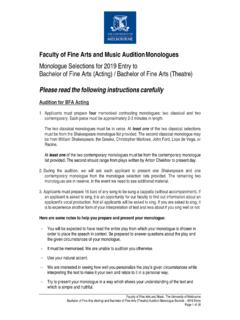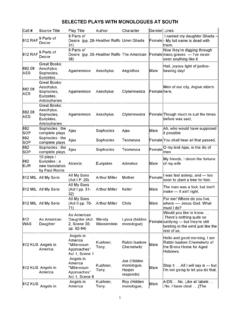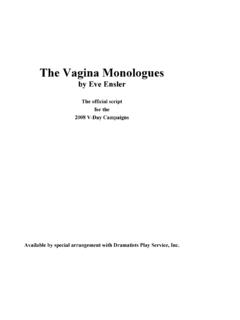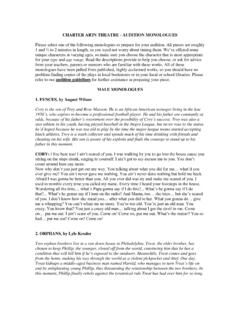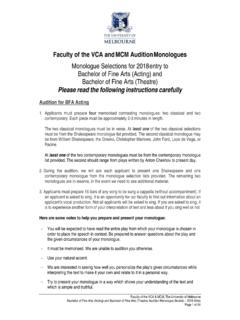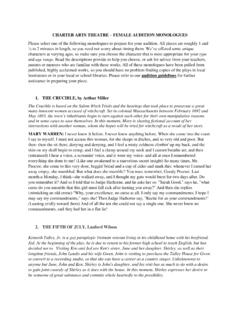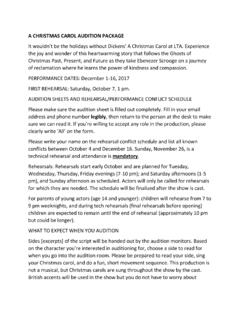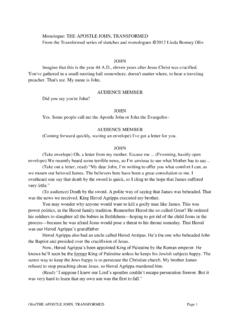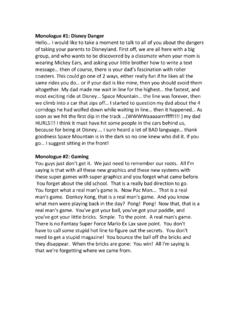Transcription of A MEMORY, A MONOLOGUE, A RANT AND A PRAYER …
1 A memory , a monologue , a rant AND A PRAYER Introduction - Eve Ensler Words. Words. This book is indeed about words. Speaking the unspoken. Speaking the spoken in a new and viable way, speaking the pain, speaking the hunger. Speaking. Speaking about violence against women not because it is the only issue, but because it is an issue that lives smack in the middle of the world and is still not spoken, not seen, not given weight or significance. So that words crack open numbness and denial and disassociation and distance and deception. Speaking so that we are in community, in conscience, in concern.
2 Speaking about violence against women because in 2006, young Amish girls are gunned down in their school just because they are girls; women are trafficked like meat sold from poor neighborhoods to men in rich neighborhoods; women are raped in Darfur on their way to get wood for the fire or grass for their donkeys. In 2006 women are burned and mutilated and stoned and dismissed and undone and refused and silenced. Speaking about violence because in early November 2006 the president of Israel stepped down after being accused of rape and harassment, and a cleric in Australia blamed uncovered women for getting raped.
3 Speaking about violence against women because of your mother, your sister, your aunt, your daughter, your girlfriend, your best friend, your wife. Speaking about violence against women because the story of women is the story of life itself. In speaking about it, you cannot avoid speaking about racism and domination, poverty and patriarchy, empire building, war, sexuality, desire, imagination. The mechanism of violence is what destroys women, controls women, diminishes women, and keeps them in their so- called place. Speaking about violence, telling the stories, because in the telling, we legitimize women s experience.
4 We reveal what is happening in the dark, in the basement, out of sight. In the telling, women take their power back. Their voice. Their remembering. Their future. As part of a two- week Until the Violence Stops festival held in New York City in the summer of 2006, we asked a group of remarkable writers to contribute memories, monologues , rants, and prayers on the subject of violence against women. We envisioned a pivotal event in which these monologues would be performed by great actors. We thought maybe, maybe, ten or twenty would respond.
5 We were overwhelmed with contributions. Each writer brought something so specific, so original, so Edward Albee it could only be Edward Albee, so Alice Walker it could only be Alice Walker, so Erin Cressida Wilson, so Michael Eric Dyson. We need writers in these terrible times of deception and manipulation and sound bites and half- investigated truths, in these times when the lust for power has trumped the hunger for justice, in these times of evildoers and saints. We don t have many real leaders, we don t have many politicians we can trust.
6 But we can trust writers. Rather than selling us something, they are exploring something; rather than dominating us, they are opening us; rather then winning or having a position, they are inviting us to ask questions. We need each and every writer, each and every artist, to tell the truth the way she or he sees it, the way it comes through her or him. Some of the work in this book is funny, some mysterious, some very difficult, some devastating. All of it is new. The first time it was performed was at the festival before two thousand people.
7 It was thrilling. The writers in this book received no payment for this work other than the deep satisfaction that comes from serving the higher good. My proceeds and the writers royalties from the sale of A memory , a monologue , a rant , and a PRAYER will benefit V- Day. (To find out more about V- Day, see page 191; you can also visit ) I thank these great playwrights, poets, journalists, visionaries, for the gift of this book, and I thank you, the reader, for taking this journey. memory Looking for the Body Music Michael Klein My friend Frank calls it looking for the body music the music my mother heard.
8 At the end of looking for the body music, one stumbles upon a woman s body with the whole world taken out of her but before that scene, a foreshadow: my mother at the boarding school. She s twelve, child of two alcoholics, vaudevillians, shadows on a stage. She s overweight and sees beyond herself even then, so the girls are mean in their pressed dresses and routinely hang my mother out the window by her feet for a long time waiting for the exactly right cadence of please before they pull her back into her life. That was in 1940- something the year my mother began the book her mind was writing called this is what happened to me the book she read to us pill- language to cushion the abyss of two marriages one husband beat her up, one husband took her money and broke her off with the world until she got written as the failed suicide after hanging by a thread by a hair, by her feet, borne of her fierce suspension over something called a youth.
9 7 Variations on Margarita Weinberg Mois s Kaufman Dedicated to the memory of Rebeca Clisci Akerman 1. My grandmother was born in the Ukraine but immigrated to Venezuela before the Second World War. She told me this story: A young Jewish woman was kidnapped by a group of Cossacks during a pogrom. They brought her into a room and held her down, deciding who would have her first. If you touch me I will put a curse on you, the woman said. I am a witch. The Cossacks laughed. I can prove it! she shouted. I can prove to you that I m a witch.
10 Their leader smiled and said, Very well. Prove it, then. I am immortal, she said, and you cannot kill me. They laughed some more. You cannot kill me. Not even if you shoot me. Try it. They stopped laughing and looked at her. Here. Try it. She pointed to her chest. Shoot me right here. You will see that I m immortal. The Cossacks looked at one another but didn t move. Shoot me in the heart. You will see I won t die. And then you ll have your proof that I m a witch. The leader thought for a moment, then quickly took out his pistol and shot her in the heart.
